June 20, 2025 | 15:02 GMT +7
June 20, 2025 | 15:02 GMT +7
Hotline: 0913.378.918
June 20, 2025 | 15:02 GMT +7
Hotline: 0913.378.918
Over the past time, dozens of farmers specializing in rice production and leaders of agricultural cooperatives have gathered at the showroom displaying and introducing agricultural products of Kien Giang Agricultural Extension Center (Rach Gia city) to visit and learn about many mechanical machines serving rice production. Accordingly, farmers are eager to find the rice cluster sowing machine, drone sowing, and spraying machine provided by Sai Gon Kim Hong in Vietnam. The CBU agricultural machine is made and imported from South Korea.
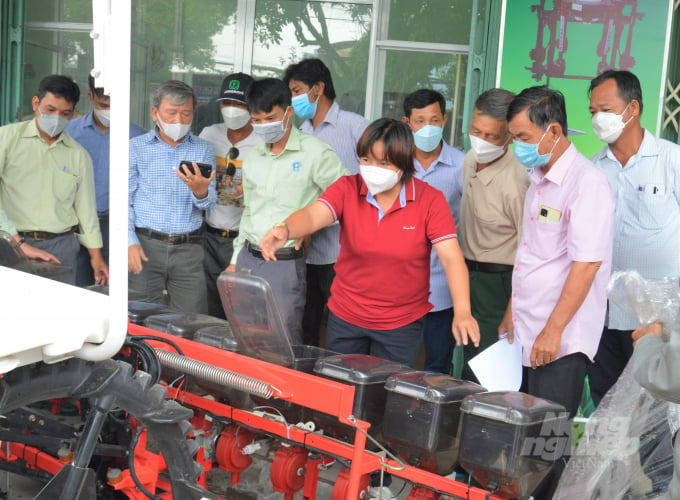
Farmers are very excited to be introduced to cluster sowing machines as it not only helps to reduce the amount of seed rice but also is a premise to apply other measures to achieve optimal rice production. Photo: Trung Chanh.
This is the opening activity for the Conference on the application of new technologies in rice production, held by the Kien Giang Agricultural Extension Center. Mr. Pham Van An, Deputy Head of Agriculture Extension, Crop and Livestock Production Department (Kien Giang Agricultural Extension Center) introduced many models of rice production in Kien Giang that have been using modern technology for production, bringing about great efficiency.
The province is now having 12 rice transplanters, planting 210 hectares in the districts of Hon Dat, Go Quao, Tan Hiep, and Giang Thanh with 70kg of rice seedlings per ha in 2021. The model of rice transplanter helps decrease fertilizer cost, pesticides, alleviate the collapse of plants, contribute to decreasing loss post-harvest, increase the quality of commodity rice, environmentally friendly and sustainable.
For the model cluster-based sowing machine, 240 hectares have been cultivated with the support of this machine in the districts of Hon Dat, Chau Thanh, Tan Hiep, and Giong Rieng, with the number of rice seedlings of 70kg/ha in 2021. This is a model that helps to minimize the amount of rice seed planting, is affordable, easy to implement…. However, the field location is necessary to be extremely good and active in irrigation and drainage.

Currently, a product line of the cluster sowing machine imported CBU from South Korea works very well. Photo: Trung Chanh.
Smart rice cultivation includes an electric pumping station remotely controlled by phone, automated water level sensor in the field, automatic water environment monitoring, smart worms monitoring station…
For the rice caring phase, employing drones to spray pesticides helps minimize the number of agents for each spraying otherwise promotes the effectiveness of the agent. Specifically, minimizing pesticide exposure to farmers throughout the spraying phase. Spraying by drone is also less expensive than human work. Currently, the province of Kien Giang has 154 drones for agricultural productivity.
In the aforementioned models, automation of sowing and planting is critical for reducing rice seedlings to the lowest level. This is also the premise for reducing fertilizer use; because rice is scarce, it attracts fewer pests, resulting in a reduction in pesticide treatment. However, utilizing a mechanical transplanter needs more laborious plating is inefficient for large areas and requires simultaneous sowing in a short period. As a result, the cluster sowing machine will be compatible with Mekong Delta farmers' sowing practices. Cluster sowing rice is similar to machine transplanted rice in terms of field ecology but is less expensive and easier to apply.
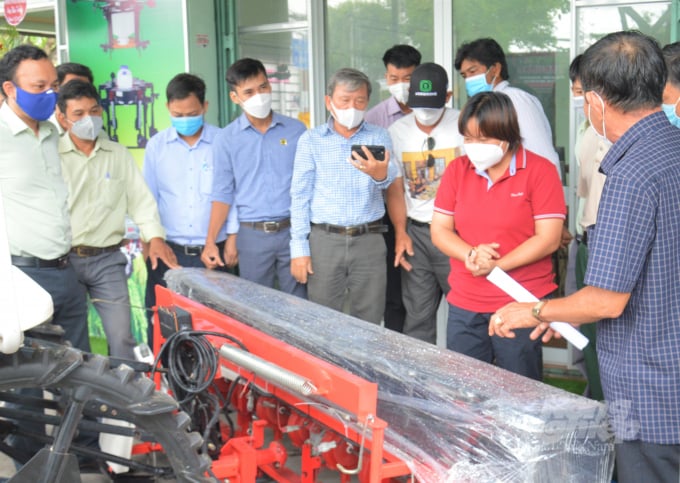
Farmers can buy the cluster seeding rigs, using a plowhead to pull, a very popular agricultural machine in the Mekong Delta, to reduce investment costs. Photo: Trung Chanh.
Currently, a product line of the cluster sowing machine is imported CBU from South Korea, which performs well but is quite expensive (about VND 400 million per unit), which discourages farmers from investing in the equipment. Alternatively, farmers might purchase the cluster seeding rigs (about VND 160 million/set) and pull them with tractors.
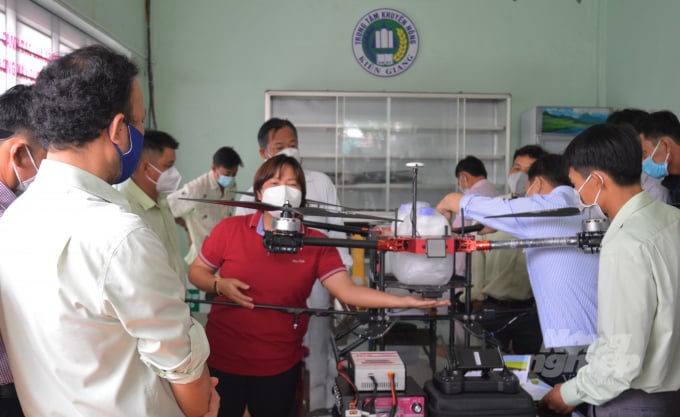
Farmers learn about the line of drones manufactured in South Korea, used to spray pesticides, which will help reduce the number of pesticides in each spray, increasing the efficiency of pesticide use. Photo: Trung Chanh.
According to Mr. Ngo Van Day, former Deputy Head of the National Agricultural Extension Center's Southern Office, to grow rice efficiently, a synchronized technological "package" is required. Because each technological development that is used in production under the proper conditions leads to increased productivity and economic efficiency gains.
Not only does the cluster sowing machine assist to minimize the amount of rice seed sowed, but it also helps to ensure that rice fields are uniformly sparse, that plants have strong tillering and enough photosynthesis, and that fertilizers and pesticides are used sparingly. Clustered rice fields, like machine-planted rice fields, seldom fall, facilitating mechanical harvesting, assuring quality, and minimizing harvest losses. It then assists in lowering expenses, increasing earnings, and improving economic efficiency after each rice-producing harvest.
Translated by Linh Linh
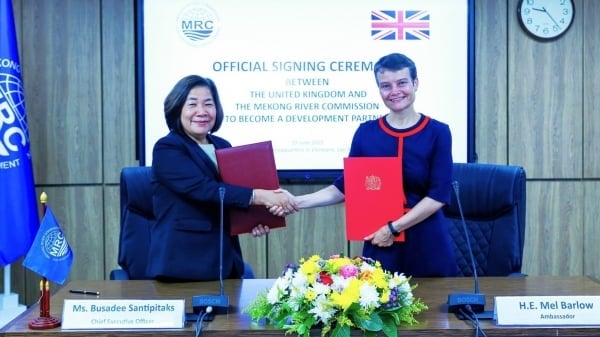
(VAN) On June 19, the United Kingdom officially became a Development Partner of the Mekong River Commission.

(VAN) Biodiversity is being threatened by traditional remedies made from wildlife. Traditional medicine and humans must change to live in harmony with nature.

(VAN) Agrifood investment and finance solutions for people and the planet.

(VAN) Microplastic contamination has become pervasive in seafood, posing unprecedented challenges for food safety and marine ecosystems.
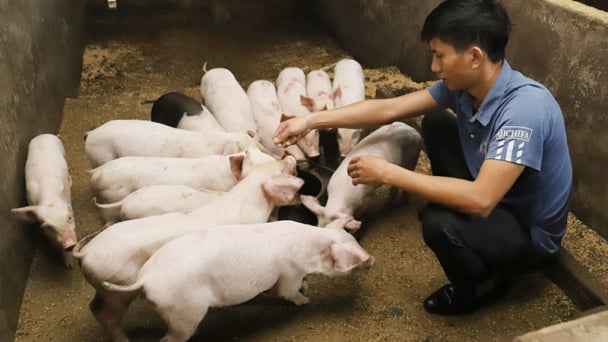
(VAN) Proactively using vaccines, combined with transport control and enhanced surveillance, is the only viable path toward biosecure and sustainable livestock production in Vietnam.

(VAN) Located in the southeast of Ho Chi Minh City, the Can Gio Mangrove Biosphere Reserve is considered the ‘green lung,’ a solid shield protecting the city.

(VAN) To address plastic pollution, closing the plastic recycling cycle will bring significant economic and environmental benefits.